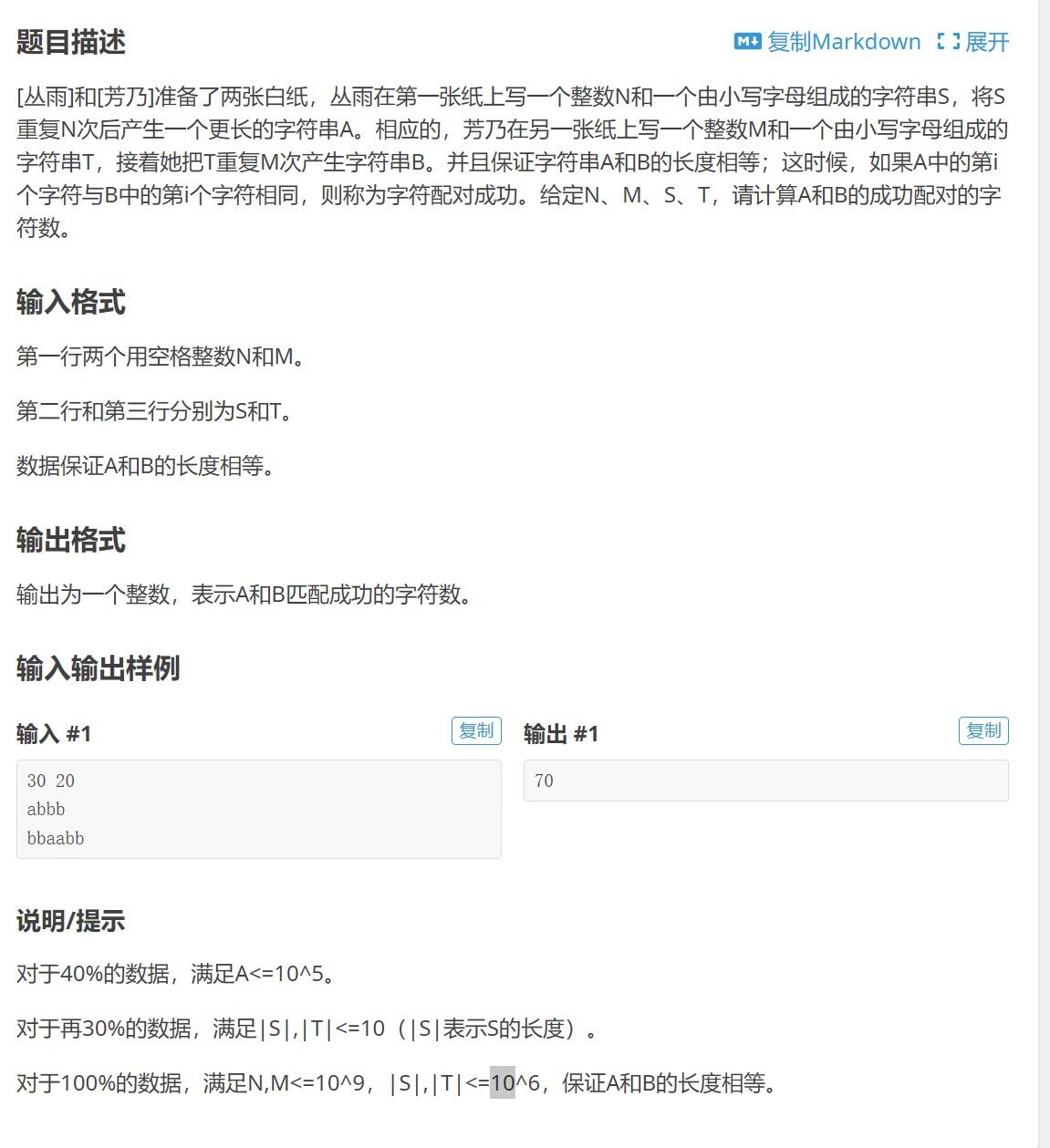字符串奇怪题

考虑S第一个字符,会和T中哪些位置上的数配对。
其实就是 \(k|S|\mod |T|\)。
然后可以打表找规律:
int main() {
int a, b;
cin >> a >> b;
int x = 0;
vector<int> all;
while (x < a * b) {
all.push_back(x % b);
x += a;
}
sort(all.begin(), all.end());
for (int i : all) cout << i << ' ';
return 0;
}
发现序列和\(gcd(|S|,|T|)\)有关,具体来说是\(d = gcd(|S|,|T|)\),那么先有 \(d\) 个0,\(d\) 个 \(d\),\(d\) 个 \(2d\) ,……,一直到\(d\)个\(kd,(k+1)d\ge|T|\)。
那么对于这个位置的贡献,只需要枚举\(T\)中\(kd\)位置的值,判断是否相等,如果是就加上\(d\)的贡献。
比如长度分别是12和20。
x=0:0 0 0 0 4 4 4 4 8 8 8 8 12 12 12 12 16 16 16 16 。
x=1:1 1 1 1 5 5 5 5 9 9 9 9 13 13 13 13 17 17 17 17 。
x=2:2 2 2 2 6 6 6 6 10 10 10 10 14 14 14 14 18 18 18 18 。
x=3:3 3 3 3 7 7 7 7 11 11 11 11 15 15 15 15 19 19 19 19 。
x=4:0 0 0 0 4 4 4 4 8 8 8 8 12 12 12 12 16 16 16 16 。
……
不难发现,从x=k的地方出发,相当于以\(d\)为循环节,首项是\(k\mod d\),公差是\(d\)的数列。
写出如下无关\(n, m\)的代码:
int main() {
cin >> a >> b >> s >> t;
int d = gcd(s.size(), t.size());
int res = 0;
for (int x = 0; x < s.size(); x ++ ) {
int cnt = 0;
for (int y = x % d; y < t.size(); y += d)
if (s[x] == t[y]) cnt ++ ;
res = res + cnt * d;
}
cout << res << endl;
return 0;
}
复杂度\(O(\frac{|S||T|}{d})\)。
由于\(0,4,8,...\),\(1,5,9,...\),\(2,6,10,...\)在\(T\)中对应的字符是一样的,产生了冗余计算,我们考虑将它们放在一起算。
我们关心的只是某个字母的出现次数,统计即可。
int main() {
cin >> a >> b >> s >> t;
int d = gcd(s.size(), t.size());
int res = 0;
for (int x = 0; x < d; x ++ ) {
memset(cnt, 0, sizeof cnt);
for (int i = x; i < t.size(); i += d)
cnt[t[i] - 'a'] ++ ;
for (int i = x; i < s.size(); i += d)
res = res + cnt[s[i] - 'a'] * d;
}
cout << res << endl;
return 0;
}
对于\(T_i\),只会在\(x = i \mod d\)的时候被枚举到一次,\(S_i\)同理。
复杂度 \(O(|S|+|T|)\)。
对拍证明,上述算法是正确的。
数据生成器:
int main() {
srand(time(0));
int n, m;
n=rand()%1000000+1,m=rand()%1000000+1;
long long t=n*m/gcd(n,m);
if (t/n>1e9||t/m>1e9) printf("%d %d\n", n, m);
else printf("%lld %lld\n", t/n, t/m);
while (n--) putchar(rand()%26+'a');
putchar('\n');
while (m--) putchar(rand()%26+'a');
return 0;
}
PS:那个打表的证明:0.7节




 浙公网安备 33010602011771号
浙公网安备 33010602011771号